|
|
|
Sort Order |
|
|
|
Items / Page
|
|
|
|
|
|
|
| Srl | Item |
| 1 |
ID:
126041
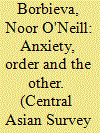

|
|
|
|
|
| Publication |
2013.
|
| Summary/Abstract |
Neither well-being nor suffering can be understood without understanding how the two experiences are related. In this paper, the author focuses on the experiences of well-being and suffering in everyday, mundane contexts, such as food preparation, cleaning and hospitality. Data presented are drawn from fieldwork conducted among ethnic Kyrgyz and Uzbeks in southern Kyrgyzstan, shortly after independence. The author discusses how the experiences of well-being and suffering are informed by symbolic systems that are linked to religious beliefs. This examination contributes to an understanding of the power of religious symbols, arguing that the expectations of well-being or suffering make systems of religious symbols more compelling.
|
|
|
|
|
|
|
|
|
|
|
|
|
|
|
|
| 2 |
ID:
126043
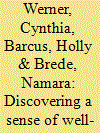

|
|
|
|
|
| Publication |
2013.
|
| Summary/Abstract |
Throughout Central Asia, the end of communism has been marked by a significant change in the management and influence of local mosques. In many rural areas, small underground mosques operated by informally trained, elderly moldas have been supplanted by newly constructed mosques led by younger, foreign-educated local imams and financed by governmental and private donations from Turkey, Saudi Arabia, and other countries. From several perspectives, this 'revival' of Islam is characterized in a way that implies that increased religiosity and piety is somewhat problematic. In this essay, based on six months of ethnographic fieldwork in Western Mongolia, we argue that such an approach prevents an understanding of how religious changes are enhancing the social and material well-being of certain actors. We explore the utility of the concept of well-being by focusing on the everyday lives of Kazakh imams in Western Mongolia. Approximately 100,000 ethnic Kazakhs live in the Western Mongolian province of Bayan-Ölgii, where they comprise about 80% of the population. Although a significant portion of the population has been migrating to Kazakhstan in the post-socialist period, the Kazakhs who choose to remain in Mongolia have experienced a significant increase in religious freedom. In this context, the new cohort of imams is playing an important mediating role as members of the local population reinterpret and renegotiate their identity as Muslims. In addition to finding spiritual well-being through their knowledge of Islam, these imams are acquiring social status and economic security from their local roles as religious leaders and through their transnational connections with a broader Muslim community.
|
|
|
|
|
|
|
|
|
|
|
|
|
|
|
|
| 3 |
ID:
126042
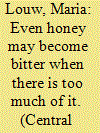

|
|
|
|
|
| Publication |
2013.
|
| Summary/Abstract |
In Kyrgyzstan, as in the rest of Central Asia, recent decades have witnessed a proliferation of distinctions between 'good' and 'bad' Islam. What is perceived as a growing 'religiosity' is often seen as a symptom of post-Soviet chaos and excess, but people equally tend to see Islam as an important source of well-being, for themselves and for society as such. It is argued that a general feature of the Islam many Muslims strive for - and occasionally experience glimpses of - is one that expresses, embodies and enables a balanced existence: a balance between well-being in this world and in the afterlife; a balance between the acceptance of one's fate and the attempt to improve one's situation; or a balance between adherence to abstract dogmas and respect for local moralities.
|
|
|
|
|
|
|
|
|
|
|
|
|
|
|
|
| 4 |
ID:
126035
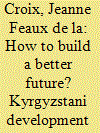

|
|
|
|
|
| Publication |
2013.
|
| Summary/Abstract |
The development industry has moved from concepts of aid and technical assistance to the idea that closing 'gaps' in people's knowledge is the most effective way of alleviating poverty and injustice. My data show the means through which this 'knowledge transfer' is actually supposed to happen. I examine the micro-politics of development: the role and agency of development workers, who are so frequently employed to conduct 'training' on a wide range of topics affecting citizens' well-being, such as conflict prevention or sustainable agricultural practices. This paper draws on ethnographic research between 2010 and 2012 with Kyrgyzstani NGO workers to analyse the 'side-effects' of development, such as the creation of a new social class and softening age hierarchies. I examine the widespread conviction among trainers that education can solve most social ills, and their concepts of how knowledge, sometimes in the guise of ideologiya, shapes people. I argue that this faith in knowledge reflects both the life course of NGO workers themselves and what they can offer from within the 'knowledge transfer' paradigm. An understanding of the friction between different expectations of knowledge content, teaching relationships and aims in creating well-being is not only essential to a critical reflection on these development efforts but also illuminates wider political and social processes and relationships, such as expectations of the state and international community.
|
|
|
|
|
|
|
|
|
|
|
|
|
|
|
|
| 5 |
ID:
126032


|
|
|
|
|
| Publication |
2013.
|
| Summary/Abstract |
In the late 1990s, I visited an acquaintance who lived in a remote mountain village of north-eastern Kyrgyzstan. In almost every way, it was a forgotten place. Built to serve as a sovkhoz (state-owned farm) connecting isolated pastures to a centralized network of services, ideologies and futures, it remained as an artefact of a system that had brought a road, some power lines and a taste for vodka. By all accounts, it was a hard place to live in that became even harder after the Soviet Union collapsed and state support for the village dried up. The altitude was too high for growing crops of any significance, trees were all but non-existent, and unemployment was described as being upwards of 90%. What such a high unemployment figure was intended to mean was unclear. There were no visible jobs aside from shepherding, but people managed to eke out some way of subsisting in a place they could not afford to leave. The characterization of life in this village became the benchmark for my understanding of misery. A Kyrgyz acquaintance put it dramatically: 'The problem is,' she said, 'that we do not die.'
|
|
|
|
|
|
|
|
|
|
|
|
|
|
|
|
| 6 |
ID:
126034


|
|
|
|
|
| Publication |
2013.
|
| Summary/Abstract |
In May 2005, after a tumultuous parliamentary election campaign had led to factionalism among the village population, village elders in northern Kyrgyzstan formed the cooperative Yiman Nuru (Light of Faith). The institution, which is headed by the local imam, was set up with the explicit aim to restore harmony and unity among all villagers. This article deals with how people in rural Kyrgyzstan try to achieve a state of well-being for themselves. Specifically, it analyses a chart the elders created upon forming the cooperative, in which they order their social and economic practices, their moral duties and responsibilities vis-à-vis other villagers, as well as their relationship with state actors, along the lines of three moral concepts: harmony, unity, and moral conduct. This chart provides a unique opportunity to probe into people's reflexivity and their own ways of reasoning about the meaning of well-being.
|
|
|
|
|
|
|
|
|
|
|
|
|
|
|
|
| 7 |
ID:
126038
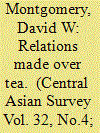

|
|
|
|
|
| Publication |
2013.
|
| Summary/Abstract |
Narratives of hardship and suffering found in portrayals of life in Central Asia elicit policy responses that attempt to remedy the situation through humanitarian or development interventions intended to enhance local well-being. This framing obfuscates a network of relationships and interactions that are instrumental in the making of meaningful lives in Central Asia. I explore the comfort of family and friends, the hope of possibility (real and imagined), and the happiness (even if fleeting) in the sharing of stories. Furthermore, even in the most trying of times, the communal sense that emerges in sharing concerns helps mitigate the stresses and strains of many social situations. Seeing these relationships as moments of well-being is essential to understanding everyday life and contextualizing hardship and suffering, and thus to conveying a fuller sense of what is understood as 'a meaningful life' in Central Asia.
|
|
|
|
|
|
|
|
|
|
|
|
|
|
|
|
| 8 |
ID:
126039
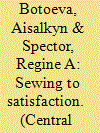

|
|
|
|
|
| Publication |
2013.
|
| Summary/Abstract |
This article focuses on the reassembling of apparel production in post-Soviet Kyrgyzstan. We contribute to this special issue on well-being in Central Asia by examining how individual craft-based apparel producers (a subset of producers in the apparel industry) describe the process through which they built upon their Soviet past and reoriented their professional trajectories in a new competitive market environment. These producers locate professional satisfaction in their ability to draw upon and creatively re-employ local knowledge and experience learned in Soviet institutions, ultimately - as they articulate and perceive - deriving pride and well-being from the process of selling highly regarded ethnically inspired apparel products both at home and abroad.
|
|
|
|
|
|
|
|
|
|
|
|
|
|
|
|
| 9 |
ID:
126037
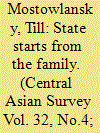

|
|
|
|
|
| Publication |
2013.
|
| Summary/Abstract |
Based on anthropological fieldwork between 2008 and 2011, this article focuses on how people in Tajikistan's eastern Pamirs conceptualize well-being through the establishment of peace and harmony. An exploration of the interactional use of the terms 'peace' and 'harmony' in Kyrgyz and Tajik (tynchtyk, yntymak, tinji, and vahdat) makes manifest that the meanings of these terms are connected to the fields of 'family', 'leadership', and 'state'. Basing their reasoning on the officially promoted analogy between family and state, people in the eastern Pamirs distinguish between social spaces that are related to well-being and those that are not. As a factor of distinction, and crucial to the establishment of peace and harmony, the moral quality of leadership plays an important role. Positive experiences of such leadership as balanced and morally pure are mainly identified and witnessed within families and neighbourhoods and only occasionally in state institutions. This discrepancy raises the question of where to locate boundaries between good and bad, moral and immoral, harmonious and conflictual. Thus, this article contributes not only to the study of local concepts of well-being in Central Asia but also to the study of local concepts of 'ill-being' which challenge them.
|
|
|
|
|
|
|
|
|
|
|
|
|
|
|
|
|
|
|
|
|